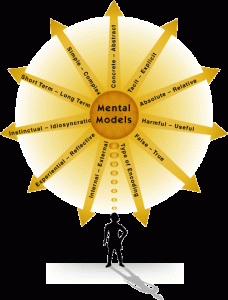
A mental model is an internal representation in your mind of some portion of external reality. I believe there is an objective external reality out there that exists independent of your mind, but you understand it and deal with it through your mental models. Your mind is a big jumble of these models and some of them undoubtedly conflict with each other. Your jumble is different than my jumble.
Many of our mental models are learned, probably absorbed from our friends, family, and culture by default. We are likely born with a tendency to some of them. For example, it appears babies are born with some rudimentary ideas about the basic physics of objects. Some of our models are chosen and modified by conscious reasoning. Whether by default or by conscious selection we have them and we use them. They rule our lives.
My coworkers hate me and undercut me every chance they get. I’m ugly. Once I achieve X, everything will be better. Money buys freedom. I need things to be happy. The universe is benevolent. Socialism destroys individual incentive. Objects obey Newton’s laws of physics. These are all possible mental models by which we attempt to deal with and interpret the world around us.
Why Should I Care About Mental Models?
Here is how Srikumar S. Rao said it in his marvelous book Are You Ready to Succeed? Unconventional Strategies to Achieving Personal Mastery in Business and Life.
“All transformation begins and ends with mental models. Because these models dictate how you act under different circumstances and how you interpret the events that happen in your life, when you change the model, you change your life.”
When you change the model, you change you life. That says all I need to know about why I should care.
Mental Models Are Important
The mental models you select to deal with external reality will play a big part in what your reality looks like in the future. Your decisions and actions accumulate upon each other in a compounding effect. Those decisions and actions are guided by your mental models. Therefore selecting the right mental models becomes a critical step in getting what you want out of life.
Are Your Mental Models True?
The problem of course is in determining what that truth is in an absolute sense. The way you see things is influenced not just by the new data coming in, but also by what’s already inside. Confirmation bias is a powerful factor even for those of us who are aware of it’s existence. Once we accept an idea, we tend to hold on to it for dear life. That fact alone should give us pause on our confidence that we know the “truth”. There are some incredibly effective and smart people whose mental models differ from mine. I’m sure that my telling them I have the truth and they don’t is going to motivate them to immediately change to my way of thinking.
Mental Models Should Be Useful
If it is useful, it doesn’t matter whether someone else believes it is true or not. It may not even really matter whether it is true or not. What matters is if it enables you to achieve your ends. For a rationally oriented person like me that’s a hard model to accept, but I believe it to be a key to success in getting what you want. The value of a mental model ultimately resides in its utility.
Useful Models Will Vary Among Individuals
My genes, my circumstances, my past experiences, my goals, and other factors may impact how well a particular model works for me. That same model may be more or less useful to you. What works for one person does not always work for another. Keep that in mind next time you want to convert someone to your truth and they resist. Just because it works for you does not mean it will for them. Maybe it will, but it is certainly not worth getting upset or frustrated about.
You Need to Be Flexible
When a mental model no longer serves your purpose, you need to be willing to modify it or drop it. You can hold on to your dogmatic truth even while it destroys you. You can be unhappy, unfulfilled, and frustrated, but you were right and I hope that makes up for it all. I would have never written or uttered those words ten years ago. My mental models have changed.
Even moving from context to context you need to be willing to switch mental models if you find it useful. When a physicist is describing the behavior of quantum particles it may be important that his model include the Heisenberg uncertainty principle. But when he gets in his car to drive home he needs to be able to reasonably predict both the position and momentum of the cars around him.
Isn’t This All Just Another Mental Model?
Yes it is, but it is one that I find incredibly useful. I think you will too.
What Mental Models Are Useful?
Srikumar S. Rao in the book I mentioned above believes that a mental model of a benevolent universe is the best general purpose mental model. It’s hard to argue with that idea because it works for many people. I can certainly see the point, but that’s a step I can’t take right now. It would create too much cognitive dissonance. I prefer a model of an indifferent universe.
In writing this blog I’m sharing with you my opinion of the most useful mental models. Here are some of my favorites and I hope you enjoy them:
You Cannot Choose the Wrong Path
Redefining Our Ultimate Goals
Don’t Sweat The Small Stuff
Are We Disconnecting From Real Life?
Own Your Circumstances and Stop Being the Victim
Choose well and live well.
